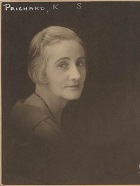 Katharine Susannah Prichard (1883-1969)
Katharine Susannah Prichard (1883-1969)
The following unattributed editorial, Working Women of Note 1: Katharine Susannah Prichard”, appeared in the Workers’ Star in 1939.
On a pleasant sunny day I met Katharine Susannah Prichard. She was seated at the typewriter in the study of her Greenmount home.
The peculiar thing about this study is that it is not attached to the house proper. A neat wooden building surrounded by shrubs, roses, fruit trees. On the floor of polished jarrah, kangaroo and ‘possum skins conveyed a sense of warmth. This was added to by the wide stone fireplace which in cooler weather blazed with a fire of whitegum logs.
K.S. had just received an invitation to attend the Women’s World Congress for Peace and Liberty. The invitation was from Charlotte Haldane, wife of Professor J. B. S. Haldane, the eminent scientist.
This Congress will follow the Pan-American Congress to be held at Havana in October. World’s most distinguished women had signified their intention to support Congress. Among others Mrs. Corbett Ashbey, Professor Winifred Cullis, Dr. Susan Isaacs, Miss Ellen Wilkinson, M.P., Madame Chiang Kai Shek, Madame Genevieve Tabouis, Miss Dorothy Parker, Mme. Irene Joliot-Curie, Dame Sybil Thorndike.
Unfortunately K.S. said through her work and many interests in W.A. it would be impossible for her to attend. The cost, too, of attending such international conferences is a big consideration, she added.
It is significant that Katharine Susannah, known as a Communist, should be invited to attend such a distinguished conference.
“It was as a young journalist in Melbourne that I first realised the terrible hardships that the great majority of people had to struggle against in order to live,” Katharine Susannah said. “Although my father was also a writer my parents were never well off. It was always a difficulty to make ends meet at home. So I developed a serious outlook on life and a determination to earn my own living as soon as possible.”
K.S. first qualified as a teacher on leaving school. While teaching she wrote in her spare time. The value of her work was recognised and she was offered a position on the Melbourne “Herald” to take charge of women’s work.
It was then K.S. came in contact with the Anti-Sweating League, saw conditions women worked under at that time.
Later went to London with commissions to write for Australian papers, and saw something of the terrible fight hundreds and thousands of people were waging against poverty. Travelled in America, France and the Continent, meeting all sorts of interesting and famous people, “among others some political refugees from Tsarist Russia who told me of their dream that some day the Russian workers would organise a Socialist government,” K.S. explained, “At that time I knew nothing of Marxism.
“It was not until the Russian Revolution was successful I realised the dream of these old Russian friends of mine had come true. I began to study the works of Marx and Engels.
“In all the years since then studying consistently, I have found no other system of ideas which offers so sound a basis for the abolition of capitalism and the reconstruction of our lives in common. Later the works of Lenin and Stalin confirmed me in this point of view. To say nothing of the unexpected and almost unbelievable demonstration which my visit to the Soviet Union provided.”
K.S. left London during the war, having achieved success there by winning the £1000 All-Empire Competition with “The Pioneers.” A few years later, she won the Triad Competition with the best three act Australian play, the “Art in Australia” competition for the best short story, and the “Bulletin” novel competition with “Coonardoo.”
Most of K.S.’s books have been published in America, some have been translated into French and Russian. Many anthologies contain examples of her work. Hartley Gratten says that K.S. is the most important writer living and working in Australia.
Despite her international reputation, it is as a comrade K.S. likes us to think of her, and we like to think of her. Her book, “The Real Russia” and writings in opposition to war and fascism and organisation in defence, of democracy and for Socialism, indicate that she has striven loyally to serve the interest of the great purpose in life.
This is borne out by the parting words of this great woman: “I owe the Party and Communist theory a great deal as a writer, because it opened my eyes to reality, and gave me,” in the Marxian dialectic, understanding of the way to think clearly and logically.”
~
“Working Women of Note 1: Katharine Susannah Prichard“, Editorial, Workers Star, 16 June 1939: 4.
Prichard’s works are still in copyright, but some may be available to be borrowed via an online library e.g. The Pioneers (1915) – links to hathitrust.org.





Beautiful naivety of her generation.
I love that so many 1930s writers were Communists. ‘Activists’ today are wishy-washy by comparison. It is only when the middle classes suffer, as in the Depression, that we are motivated to do something about ‘changing the system’.
Yes, we found, in Russia and elsewhere, that dictatorship by the proletariat soon becomes dictatorship by the ‘leader’; but there was so much optimism back then. I wish we had it now.
Perhaps, Bill, we’ve learnt our lesson that hopes are usually dashed because humans will be humans. I’m actually not a cynic – just a realist!